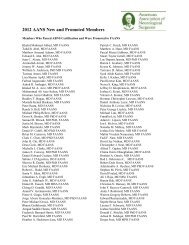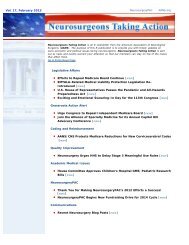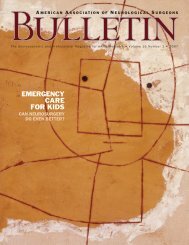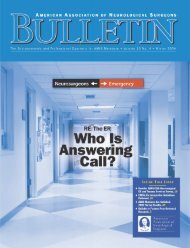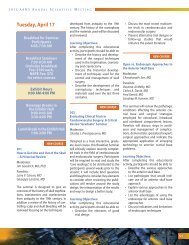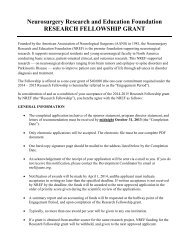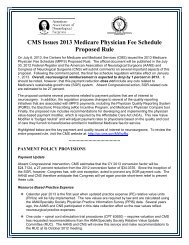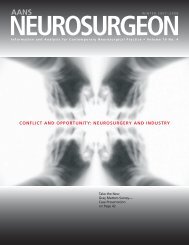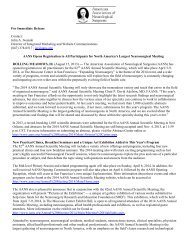view PDF - American Association of Neurological Surgeons
view PDF - American Association of Neurological Surgeons
view PDF - American Association of Neurological Surgeons
You also want an ePaper? Increase the reach of your titles
YUMPU automatically turns print PDFs into web optimized ePapers that Google loves.
R ESIDENTS’ F ORUM K. MICHAEL W EBB, M D, AND L AWRENCE S. CHIN, M D<br />
Evaluating a New Job<br />
Rank Your Priorities and Do Your Homework<br />
After many years <strong>of</strong> residency, the<br />
prospect <strong>of</strong> getting a job is very<br />
exciting. Unfortunately, that excitement<br />
can make it difficult to evaluate<br />
a potential practice rationally. During<br />
residency one learns little about the business<br />
side <strong>of</strong> neurosurgery, and there is no<br />
chapter in Greenberg to help you out.<br />
Guidance for evaluating job opportunities<br />
in both academic and private settings is the<br />
subject <strong>of</strong> this Residents’ Forum.<br />
The first step in looking for a job is to<br />
determine what is most important to you<br />
and your family. The main factors to consider<br />
are the practice’s location, income<br />
potential and financial strength, as well as<br />
your interest in a subspecialty and<br />
research opportunities. Rank these factors<br />
in order <strong>of</strong> importance, but remember<br />
that every job requires some compromise.<br />
To decide what is negotiable, you must<br />
know your priorities.<br />
Location<br />
Location may be <strong>of</strong> primary importance,<br />
particularly if you have a family. Most<br />
hospitals, <strong>of</strong>fices and operating rooms<br />
look the same, and you will spend most <strong>of</strong><br />
your time there. Your family, however,<br />
will need to deal with jobs elsewhere as<br />
well as with schools, new neighbors and<br />
friends, and the like. Talk to people who<br />
know the area well, and make sure that<br />
you spend at least a few days exploring<br />
the area on your own to examine commute<br />
times, access to shopping and recreation,<br />
and other things that are important<br />
to your life outside <strong>of</strong> work.<br />
Income Potential<br />
Of the 800 neurosurgical job openings<br />
each year, approximately 5 percent to 10<br />
percent are academic jobs. Of approximately<br />
150 residents graduating each<br />
year, about 50 go on to fellowships,<br />
research or military positions, leaving 100<br />
residents entering the job market. At an 8<br />
1 ratio <strong>of</strong> jobs to graduates, the odds favor<br />
you heavily. Regardless <strong>of</strong> your academic<br />
interests and research prowess, remember<br />
that your income will largely be determined<br />
by your clinical activity. Additional<br />
training such as an endovascular or<br />
spine fellowship will allow you to command<br />
a premium salary.<br />
Because it is a job-seeker’s market, academic<br />
practices have increased their starting<br />
salaries to be more competitive with<br />
private practices. However, this relative<br />
equality ends after a few years, as private<br />
practitioners become partners in their<br />
practices. Compensation <strong>of</strong> private practitioners<br />
is on average 20 percent to 50<br />
percent higher than that <strong>of</strong> their academic<br />
counterparts. So if you are considering<br />
joining a private practice, ask about the<br />
path toward partner status (for example,<br />
time frame and board certification), but<br />
remember, everything is negotiable. Practices<br />
with large assets such as <strong>of</strong>fice buildings<br />
or surgery centers may require a<br />
buy-in—but be wary if the assets are not<br />
easily valued.<br />
Academic compensation is frequently<br />
tied to rank. Be aware that the salary differential<br />
between a full pr<strong>of</strong>essor and a partner<br />
in private practice may be less than anticipated,<br />
particularly when you factor in benefits<br />
such as travel compensation, insurance<br />
benefits and malpractice coverage.<br />
Financial Strength<br />
Most academic practices associated with a<br />
medical school are either a department,<br />
which indicates more financial responsibility<br />
and direct reporting to the dean, or a<br />
division <strong>of</strong> general surgery where financial<br />
decisions are made in conjunction with the<br />
chair <strong>of</strong> surgery—though financial independence<br />
for divisions <strong>of</strong> neurosurgery is<br />
not uncommon. Obviously, a private practice<br />
is completely responsible for its<br />
finances. In addition to paying salaries, a<br />
practice must pay employee benefits, <strong>of</strong>fice<br />
rental, supplies, resident expenses and pr<strong>of</strong>essional<br />
liability insurance. Any remaining<br />
money may be paid as a bonus or used for<br />
practice development.<br />
You should meet with the business manager<br />
to evaluate the practice’s financial condition.<br />
Let the manager know in advance<br />
what you want to learn, so this person can<br />
be prepared with the right information. On<br />
the income side, look for the amounts billed<br />
and collected, as well as income from alternate<br />
sources such as pain clinics, ambulatory<br />
surgical centers, <strong>of</strong>fice building rents and<br />
other sources. On the expense side, look at<br />
the “dean’s tax,” salaries and overhead. Also,<br />
ask if bonuses have been based on case<br />
numbers or relative value units and whether<br />
Continued on page 38<br />
36 AANS Bulletin • www.AANS.org



